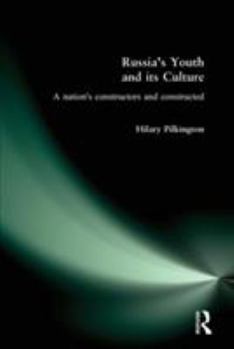Russia's Youth and its Culture: A Nation's Constructors and Constructed
Select Format
Select Condition 
Book Overview
Since the political whirlwinds of the mid-1980s and the fall of communism in 1991, Russia has undergone dramatic social change, much of which has escaped the attention of Western media.
In her new book, Hilary Pilkington applies the methods of cultural studies research to the study of Russian youth. She does this by deconstructing' the social discourses within which Russian youth has been constructed and by providing an alternative reading of youth cultural activity, based on an ethnographic study of Moscow youth culture at the end of the 1980s.
The book also charts the passage of western youth cultural studies in the twentieth century and suggests some new ways forward in the light of the Russian experience. Hilary Pilkington traces the cultural themes of youth culture in the Anglo-American tradition and within the Soviet Union, before examining the impact of perestroika on the media and its ramifications for the discussion of youth. The book ends with a study of young people in Moscow and youth cultural groups; the product of field work and interviews in the city.





